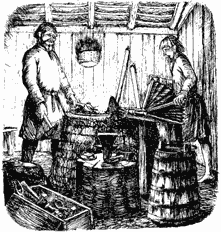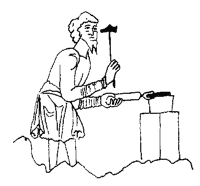The Forging
She followed him up to the promontory. It was an easy job, for he was lame and she was quick, and could stay well back. At last he reached a flat, grassy patch where he could look out of the fjord, onto the wide sea beyond. He watched the longships make their way south. They were off to fight for the Jarl, against the forces of the King. She watched him watching the ships for a while, then called out 'Why didn't you go with them, Clubfoot?'
He turned around, red with embarrassment and rage, 'Leave me alone.'
'Were you afraid? Was that it?'
'You know why.' He pounded on his hobbled leg. No fighting ship would take a man who could not run or row. He knew this, for he had tried. She knew it too, but this could not stop her from taunting him. They had been friends, once, not long ago, when they were children. They had talked and laughed and played together. She had been his only friend. Then, when other children began to laugh at her for being with him, she drifted away. So, to join her new friends, she had taunted him, mocked him worse than the others. To prove that she was free of him, free from the taint of his deformity.
Now, as a young woman, she still laughed at him. 'Poor Clubfoot, never held a sword in his life.'
She left him at the town, as he made his way to the forge.
He had, in fact, held many swords in his life. As the smith's apprentice he had made some, and hilted others. None of the swords matched the Frankish war-blades though. The town smith knew little of his craft, and practiced less. Clubfoot knew all his lore, and more, for he learned from the journeyman smiths who occasionally passed through. But the smith still kept him apprentice, passing off Clubfoot's work as his own. For with his lameness he could not go anywhere else.
But that night, in the forge, the girls words came back to him. Never held a sword in his life. He smiled, and took some iron rods to the forge. He told the forge boy to fire it to its highest temperature. Placing each rod in turn into the cleanest flame, he beat them, folding them back on themselves, and then beating them out to their original length. When he had done each he was left with many flat strips, some shorter but wider than the others. The next night he took nearly half the charcoal he could find. He had them in the forge fire for many nights.

'What are you doing?' his master blustered, when he found out what was going on.
'Forging something that will make your reputation as a smith' Clubfoot replied. That earned him a cuff, but he was not stopped. The smith knew too well the value of his work.
The next day, Clubfoot took three of the now black, hard and brittle strips. He sandwiched them between four wrought strips of the same length, which were soft and springy. The seven strips now formed a square rod, alternating hard and soft, flexible and brittle. This rod he heated and twisted and hammered, until the strips joined.
One day, the girl looked into the forge. 'Have you heard, Clubfoot? There was a great battle, and the Jarl has beaten the King. Soon all the men will be coming back as heroes. What will poor cowardly Clubfoot do then?' But he ignored her and kept twisting his rods.
When he had the first rod finished, he moved on to another, the same size, and then two more, thinner but longer. Whilst he was working on these, the girl looked in again. 'You'd better start running Clubfoot. The Jarl is dead, and the King is coming north. If you run now, you may escape him.'
While still twisting the rod he replied 'Kings and Jarls are nothing to me. But I will not run.'
When the last rod was complete, he put all four together, the two longer ones between the two thicker. He sprinkled iron dust between the rods, and took them to the forge fire. Carefully he forge welded the rods together, adding more iron dust as was needed. Finally he had the body complete.
He spent most of his time in the forge - there was little for him outside. But once, when he did go out, he noticed that the town was silent. The girl saw him. As if remembering their broken friendship, she spoke to him. 'The King has come to the next fjord. They say that, in his rage at the rebellion, he has had put to death everyone that could be found there.'
He smiled slightly 'Perhaps it is so. Still, I will remain here. And if he wishes to find me, I will wait for him.'
He took the last strips of the wrought iron, and shaped it to go round the body. He then fired it in the charcoal to harden it. Then he welded it round the body. It was now ready to be finished, ground, honed, polished and etched. This done he attached a crossguard, handle and pommel of a simple sword. Yet it did not look like one. For the length of the blade was run with serpentine interlace, the hard and soft iron twisted together - a union of strong and flexible. He tested the blade - bending it as far as it would go - but it did not break. He was satisfied.

The smith burst into the forge, agitated. 'The King has anchored in the fjord. In the morning he will be here. I must run.' He began searching for his few valuables. Then he saw the sword in its maker's hands. Entranced by its beauty and the excellence of its forging, he reached for it. The sword forger put its tip on the smith's chest.
'No-one touches this save I.' The smith fled. The sword-forger doused the fire and went into the twilight town.
In the main square people had been gathering as night fell. Some said that they should give a tribute to the King, pledge fealty, and hope that he went away. Others pointed to his rumoured ruthlessness, and said that flight was the best answer.
Into this came the lame man. At once the louder voices fell silent, and all began whispering. 'Whence came his sword? What would he do?' At last the girl spoke 'Do you mean to fight the King?'
He paused, then replied 'I go to wait for him.'
A voice in the crowd: 'The cripple means to fight the King. The cripple is mad.'
The sword-forger turned on him. 'I am not a cripple. I am not a clubfoot. I am a man.' He left them and went to the jetty.
After an hour in the darkness the girl joined him. She was carrying an ancient spear, and had a house knife thrust into her belt. 'Do you mean to fight?' she asked again.
This time, softly, he replied 'If the King wishes to, I will fight. But I will wait first.' The spear maiden nodded, and stood next to him.
Later, someone else came, armed with a club. Then others, carrying what makeshift weapons they could find. Eventually, there was most of the town, old men, women, children, waiting behind their leader; waiting for the morning:
Waiting for the King.